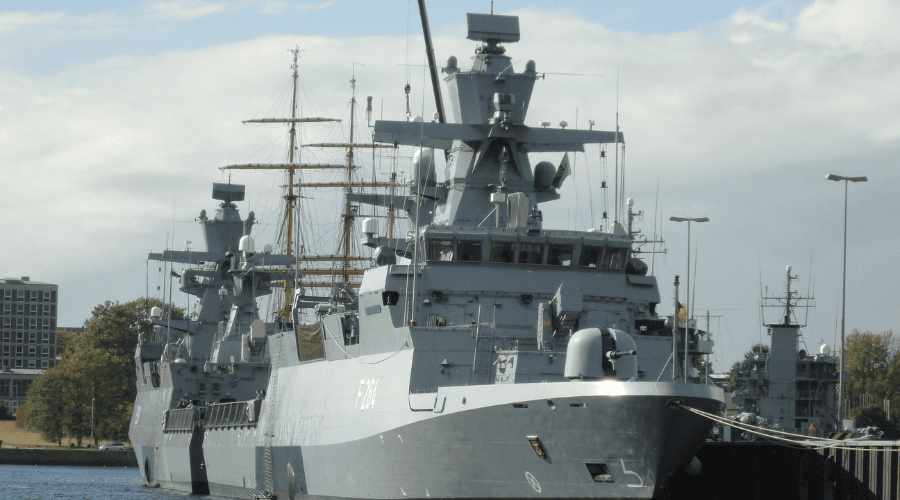
In response to increasing concerns over North Korea’s advancing nuclear weapons program, the United States has deployed a group of warships to the Korean Peninsula. This move is seen as part of the US’s ongoing efforts to assert its military presence in the region and maintain strategic readiness in the face of growing threats from North Korea.
The US Navy’s Carl Vinson Strike Group, which includes an aircraft carrier along with several accompanying warships, is equipped with powerful strike capabilities designed to bolster US military strength in the Pacific. The group is currently en route to the western Pacific as part of a broader strategy to demonstrate US commitment to regional security.
The US Pacific Command (USPACOM) emphasized that the deployment of the Carl Vinson Strike Group is “a prudent measure to maintain readiness in the region.” This move is not only a signal of military preparedness but also a show of support for US allies in the region, such as South Korea and Japan, who have expressed concerns about North Korea’s continued missile and nuclear tests.
The US has frequently conducted military exercises and deployments in the region as part of its long-standing policy to maintain a strong presence in the Asia-Pacific. The presence of such a powerful fleet is intended to deter North Korean aggression and assure allies that the US is committed to upholding peace and stability in the region.
Recently, tensions between airlines and passengers have also made headlines. For example, in a widely reported case, United Airlines reached a settlement with a passenger who was forcibly removed from a flight. While unrelated to military action, such incidents highlight the broader concerns of safety and accountability in international travel.
North Korea’s nuclear program has become a significant international issue, with the country conducting multiple missile tests and pursuing the development of weapons capable of reaching the US mainland. The regime under Kim Jong-un has continued to defy international sanctions and UN resolutions, drawing widespread condemnation from the global community.
As North Korea continues to push the boundaries of its military capabilities, US officials have reiterated their resolve to prevent the country from acquiring operational nuclear weapons. President Donald Trump, in recent statements, has underscored that the US is prepared to act unilaterally if necessary to counter North Korea’s nuclear ambitions.
President Trump has repeatedly stated that the US is “ready to act alone” to address the threat posed by North Korea’s nuclear weapons program, should diplomatic efforts fail. This rhetoric has raised concerns about the potential for military conflict, as tensions between the US and North Korea have reached levels not seen in recent years.
Meanwhile, the aviation industry has also seen an increase in bizarre events, such as the shocking incident where a scorpion attacked a passenger aboard a United Airlines flight. These incidents, though unrelated to military strategies, have sparked concerns about airline safety and passenger rights.
Despite diplomatic efforts by the US and other countries to engage North Korea in talks, the country has shown little willingness to abandon its nuclear ambitions. As a result, the US has increasingly focused on military deterrence, economic sanctions, and regional alliances to put pressure on the North Korean regime.
The deployment of the Carl Vinson Strike Group is also seen as part of the US’s broader strategy in the Indo-Pacific region, where it aims to maintain a balance of power and counter China’s growing influence. The US has been strengthening its relationships with key regional allies and partners, including Japan, South Korea, and Australia, to address both North Korean threats and broader security challenges in the region.
The move has sparked concerns in Beijing, which views the US military presence in the region as a challenge to its own strategic interests. However, US officials have stressed that the deployment is focused on deterring North Korean aggression and ensuring the stability of the region, rather than provoking China.
The deployment of US warships to the Korean Peninsula has been met with mixed reactions globally. While US allies in the region have largely welcomed the show of strength, countries like Russia and China have expressed concern over the potential for escalating tensions in the region.
As the situation continues to unfold, experts warn that the US may be facing a difficult choice between further military escalation or seeking renewed diplomatic efforts to curb North Korea’s nuclear program. The presence of the Carl Vinson Strike Group, however, serves as a clear reminder that the US is committed to ensuring that North Korea’s nuclear capabilities do not pose a direct threat to regional or global security.
The coming months may prove pivotal in determining the direction of US-North Korea relations and the overall security landscape in East Asia. For more news and updates, visit Diario Palm Beach or contact us through our Contact Page. To learn more about our publication, check out our About Us section.
As North Korea continues to push the boundaries of its military capabilities, US officials have reiterated their resolve to prevent the country from acquiring operational nuclear weapons. President Donald Trump, in recent statements, has underscored that the US is prepared to act unilaterally if necessary to counter North Korea’s nuclear ambitions.
President Trump has repeatedly stated that the US is “ready to act alone” to address the threat posed by North Korea’s nuclear weapons program, should diplomatic efforts fail. This rhetoric has raised concerns about the potential for military conflict, as tensions between the US and North Korea have reached levels not seen in recent years.
Despite diplomatic efforts by the US and other countries to engage North Korea in talks, the country has shown little willingness to abandon its nuclear ambitions. As a result, the US has increasingly focused on military deterrence, economic sanctions, and regional alliances to put pressure on the North Korean regime.
The deployment of the Carl Vinson Strike Group is also seen as part of the US’s broader strategy in the Indo-Pacific region, where it aims to maintain a balance of power and counter China’s growing influence. The US has been strengthening its relationships with key regional allies and partners, including Japan, South Korea, and Australia, to address both North Korean threats and broader security challenges in the region.
The move has sparked concerns in Beijing, which views the US military presence in the region as a challenge to its own strategic interests. However, US officials have stressed that the deployment is focused on deterring North Korean aggression and ensuring the stability of the region, rather than provoking China.
The deployment of US warships to the Korean Peninsula has been met with mixed reactions globally. While US allies in the region have largely welcomed the show of strength, countries like Russia and China have expressed concern over the potential for escalating tensions in the region.
As the situation continues to unfold, experts warn that the US may be facing a difficult choice between further military escalation or seeking renewed diplomatic efforts to curb North Korea’s nuclear program. The presence of the Carl Vinson Strike Group, however, serves as a clear reminder that the US is committed to ensuring that North Korea’s nuclear capabilities do not pose a direct threat to regional or global security.
The coming months may prove pivotal in determining the direction of US-North Korea relations and the overall security landscape in East Asia.




